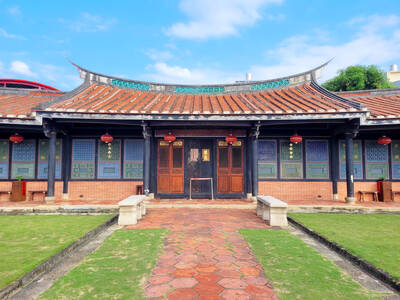Steve Haworth, a filmmaker in Vancouver, turned the camera on himself and his family when he decided to undergo a long process that saw him become Gwen.
Kyle, a 15-year-old girl living near Austin, Texas, reveals the everyday discrimination she has to deal with as one of the more than 10 million children with gay or lesbian parents in the US.
These are two of the stories moviegoers will see at the Women Make Waves Film Festival (WMW, 女性影展), now in its 15th year. In addition to its annual highlighting of a wide breadth of issues related to gender and sexuality, this year’s event also turns the spotlight on female filmmakers in South Korean noted for their diverse styles and polished productions.
Selected films in the festival’s Body, Family and Desire section reflect and reexamine how the traditional familial structure and legal and social systems have been either fundamentally changed or challenged in the face of diverse sexual landscapes. Queer Spawn takes an intimate and revealing look at the lives of teenagers who have lesbian or gay parents in the US. Oscar-winning documentary Freeheld chronicles Detective Lieutenant Laurel Hester’s struggle to transfer her pension to her lesbian partner after being diagnosed with terminal cancer. The most moving moments in the film take place in the courtroom, where straight male police officers all come out to fight for their dying colleague.
Through one-on-one interviews, archival family footage and animation, She’s a Boy I Knew goes far beyond a mere account of director Gwen Haworth’s biological transition from male to female. The emotionally charged film candidly shows the frustrations, fears, angers, understanding and support experienced by Haworth and her parents, sisters and wife. It allows audiences to come close to a transsexual’s life and to question our underlying assumptions about gender identity.
Two women directors take a road trip across the US in Bi the Way, trying to seek answers to the question of whether bisexuality is just a passing fad. One of the witnesses they locate believes that for the younger generation, choosing to be bi, gay or straight is like deciding to have Chinese or Italian food for dinner.
Feminism and other women-related subjects are explored in films such as We Want Rose Too, a visually striking documentary that mixes animation, historical footage and television commercials to examine the changes brought by the sexual revolution and feminist movement in Italy during the 1960s and 1970s. Over the Hill, meanwhile, shows how the beauty industry in Los Angeles sets standards not only for women’s faces and figures but for more intimate parts of their bodies as well.
On the fictional side, multiple award-winning Mermaid by Russian director and writer Anna Melikian is a whimsical and dreamlike tale about the journey of Alisa, a girl with magic powers, from her seashore shack to Moscow. The story is entertainingly well-scripted and enriched by an imaginative visual sensibility.
Artemisia (艾草), by Taiwan’s young filmmaker Chiang Hsiu-chiung (姜秀瓊), is a well-executed drama on Ai-tsao, a representative of the first generation of career women in Taiwan, who strives to adapt to an ever-changing society and make peace with her children who have been raised with values and world views different from her own.
The main attraction this year is productions by South Korean female directors who create new faces and roles for women rather than complying with the archetypes used by mainstream media. Based on a true story, Forever the Moment is a touching drama about three former athletes-turned-housewives returning to the field to lead the women’s handball team to the 2004 Athens Olympics.
Both The Wonder Years and Before the Summer Passes Away exemplify a common feature in the works of contemporary South Korean women filmmakers who reject the genres of melodrama or romantic comedy and choose to portray the lives of women through more realistic approaches.
Among the selected South Korean shorts, surrealistic animation Things She Can’t Avoid in the City pictures a woman who can only afford to rent a house that’s on the verge of being demolished and whose relationship with her cat boyfriend is about to collapse. Award-winning Lionesses is a thrilling drama about a housewife who uses cannibalism to fight back against her violent husband.
Women Make Waves will tour the country from Oct. 27 to Dec. 31. For more information, go to the event’s bilingual Web site at www.wmw.com.tw.

A jumbo operation is moving 20 elephants across the breadth of India to the mammoth private zoo set up by the son of Asia’s richest man, adjoining a sprawling oil refinery. The elephants have been “freed from the exploitative logging industry,” according to the Vantara Animal Rescue Centre, run by Anant Ambani, son of the billionaire head of Reliance Industries Mukesh Ambani, a close ally of Prime Minister Narendra Modi. The sheer scale of the self-declared “world’s biggest wild animal rescue center” has raised eyebrows — including more than 50 bears, 160 tigers, 200 lions, 250 leopards and 900 crocodiles, according to

They were four years old, 15 or only seven months when they were sent to Auschwitz-Birkenau, Bergen-Belsen, Buchenwald and Ravensbruck. Some were born there. Somehow they survived, began their lives again and had children, grandchildren and even great grandchildren themselves. Now in the evening of their lives, some 40 survivors of the Nazi camps tell their story as the world marks the 80th anniversary of the liberation of Auschwitz-Birkenau, the most notorious of the death camps. In 15 countries, from Israel to Poland, Russia to Argentina, Canada to South Africa, they spoke of victory over absolute evil. Some spoke publicly for the first
Due to the Lunar New Year holiday, from Sunday, Jan. 26, through Sunday, Feb. 2, there will be no Features pages. The paper returns to its usual format on Monday, Feb. 3, when Features will also be resumed. Kung Hsi Fa Tsai!

When 17-year-old Lin Shih (林石) crossed the Taiwan Strait in 1746 with a group of settlers, he could hardly have known the magnitude of wealth and influence his family would later amass on the island, or that one day tourists would be walking through the home of his descendants in central Taiwan. He might also have been surprised to see the family home located in Wufeng District (霧峰) of Taichung, as Lin initially settled further north in what is now Dali District (大里). However, after the Qing executed him for his alleged participation in the Lin Shuang-Wen Rebellion (林爽文事件), his grandsons were